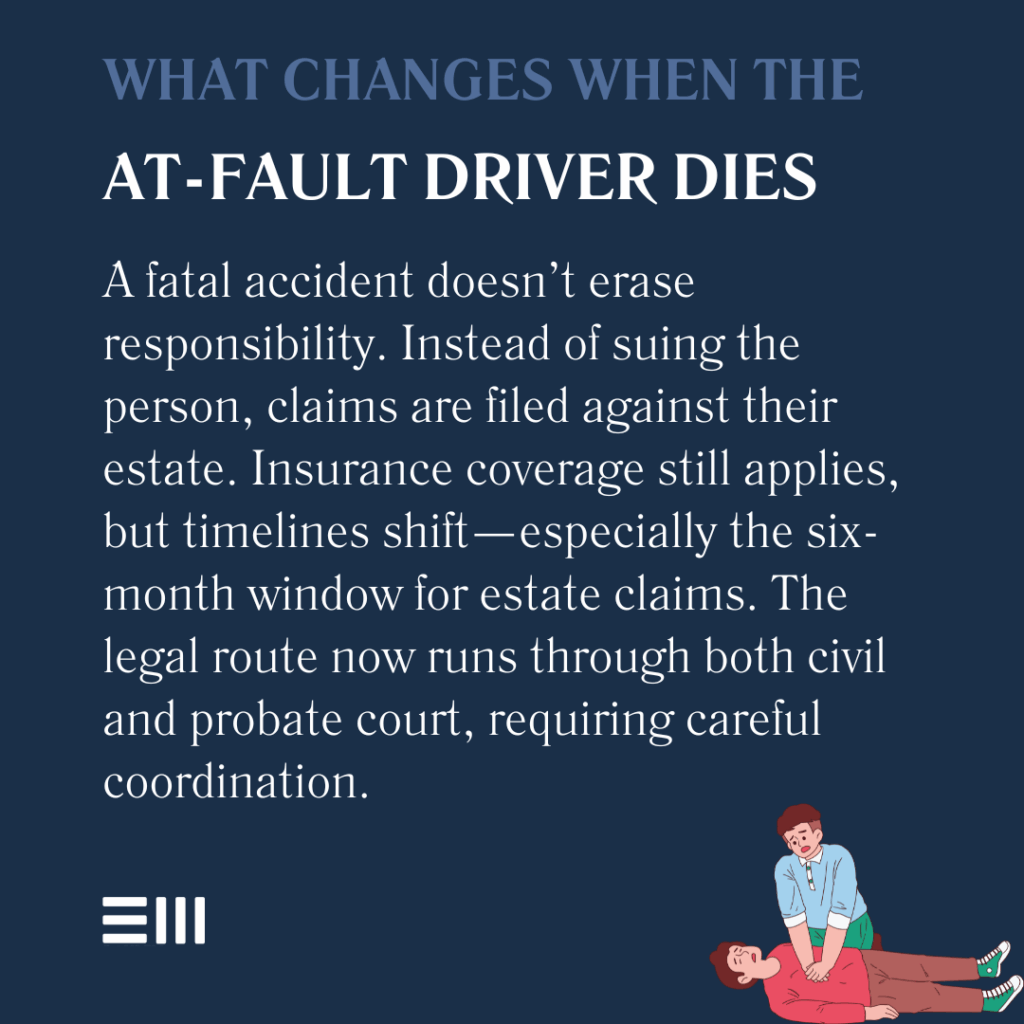
The police report states clearly: the other driver crossed the centerline. Their actions caused your injuries, damaged your vehicle, and upended your life.
But unlike most car accident scenarios, you cannot seek justice directly from the person responsible—they did not survive the collision.
In the midst of your own physical recovery, you now face a different path to compensation, one that winds through estates, insurance policies, and sometimes, the courts.
These cases exist at the intersection of personal injury law and probate proceedings, creating unique challenges for injured parties who still deserve to be made whole despite the responsible party’s death.
How Claims Change When the At-Fault Driver Dies
When the driver responsible for a car accident dies, the legal process for seeking compensation takes a different path than typical car accident claims. Understanding these differences helps injured parties navigate the modified procedures effectively.
The key changes to the claims process include:
- Claims shift from being against the individual to being against their estate;
- Different deadlines may apply for filing claims against estates;
- The burden of proof remains the same—negligence must still be established;
- Insurance coverage for the deceased driver generally remains available;
- Emotional and practical challenges may arise from pursuing claims after a fatality; and
- The case may involve both probate court and civil court proceedings.
These shifts in the legal landscape require specialized knowledge of both personal injury law and probate procedures. While the responsible driver’s death complicates the process, it does not eliminate your right to seek compensation for legitimate injuries and damages.
The legal system provides alternative pathways to ensure injured parties can still pursue just compensation.

Filing Claims Against the Deceased Driver’s Estate
In Alabama, when the at-fault driver dies, injury claims typically must be filed against their estate rather than against them personally. This process intersects with probate law and follows specific procedural requirements.
Important considerations when filing against an estate include:
- Claims must be filed within six months of the estate being opened;
- The claim must be properly presented to the personal representative or executor;
- If no estate has been opened, you may need to petition the probate court;
- Claims against estates are categorized by priority under Alabama law;
- The estate’s assets may be limited, potentially affecting full recovery; and
- Probate proceedings can delay resolution compared to standard claims
Filing against an estate requires precision in both timing and procedure. Missing critical deadlines or failing to present claims properly can result in the permanent loss of recovery rights.
Working with attorneys familiar with both personal injury claims and probate proceedings helps ensure these specialized requirements are met appropriately.
Insurance Coverage in Fatal Accident Cases
Even when the at-fault driver dies, their insurance policies typically remain valid and provide the primary source of compensation for injured parties. Understanding how insurance functions in these cases is essential for maximizing recovery.
Key insurance considerations include:
- The deceased driver’s liability insurance generally covers claims despite their death;
- Policy limits remain the same and may constrain total available compensation;
- Additional coverage like umbrella policies may provide supplemental compensation;
- Uninsured/underinsured motorist coverage from your own policy may apply;
- The insurance company’s obligations to defend and indemnify transfer to the estate; and
- Medical payments coverage may provide additional resources regardless of fault.
Insurance companies may approach claims differently when the policyholder is deceased, sometimes making more conservative settlement offers due to the complications involved.
Understanding available insurance coverage and how to properly access these resources ensures that injured parties pursue all appropriate sources of compensation rather than only focusing on the estate’s assets.

Comparative Negligence Issues in Fatal Accident Claims
Alabama follows a contributory negligence rule that can significantly impact recovery in cases where the at-fault driver has died. This strict standard presents unique challenges in fatal accident scenarios.
Critical aspects of negligence in these cases include:
- Alabama’s contributory negligence rule bars recovery if the injured party was even 1% at fault;
- Evidence gathering becomes more challenging when one party is deceased;
- The “dead man’s statute” may limit certain testimony about interactions with the deceased;
- Accident reconstruction and independent witnesses become especially important;
- Navigating potential jury sympathy toward a deceased driver requires strategic approach; and
- Preserving physical evidence quickly becomes even more critical.
The combination of Alabama’s strict contributory negligence standard and the evidentiary challenges in fatal accident cases creates a complex legal environment.
Building a strong case requires thorough investigation and careful presentation of evidence to establish the deceased driver’s full responsibility while addressing potential contributory negligence defenses.
Damages Available in Claims Against Deceased Drivers
Alabama law permits various types of damages in claims where the responsible driver has died, although some limitations may apply compared to standard personal injury cases.
Potential recoverable damages include:
- Medical expenses for treating accident-related injuries;
- Lost wages and diminished earning capacity;
- Property damage to vehicles and personal belongings;
- Physical pain and suffering experienced due to injuries;
- Mental anguish and emotional distress;
- Permanent disability or disfigurement compensation; and
- Loss of consortium for spouses of injured parties.
While punitive damages are generally not pursuable against estates in Alabama, the full range of compensatory damages remains available.
The goal remains the same as in any personal injury case: to make the injured person “whole” by addressing both economic and non-economic impacts of their injuries.
Frequently Asked Questions About Claims Against Deceased Drivers in Alabama
When pursuing compensation after an accident where the at-fault driver died, many injured parties share common questions about their legal options and the process.
The following answers address typical concerns in these unique cases.
How Long Do I Have to File a Claim When the At-Fault Driver Dies?
Two critical timelines apply: Alabama’s two-year statute of limitations for personal injury claims and the six-month window for filing claims against estates after they’re opened. Missing either deadline can bar recovery, so prompt action is essential regardless of the responsible party’s death.
Can I Still Recover if the Deceased Driver Had No Insurance?
Yes, potential options include claims against the estate’s assets, your own uninsured motorist coverage, and possibly third-party claims if other factors contributed to the accident. Even without insurance, multiple avenues for compensation may exist depending on your specific situation.
What if the Deceased Driver’s Estate Has Limited Assets?
Insurance proceeds typically pay claims directly without passing through the estate, so limited estate assets may not affect insurance-based recovery. However, if damages exceed insurance limits, estate asset limitations can impact full compensation, making thorough investigation of all potential recovery sources important.
How Do Settlement Negotiations Work When the Driver is Deceased?
Settlement negotiations typically occur with the deceased’s insurance company and/or the estate’s personal representative. While the process follows similar patterns to standard claims, additional considerations about estate administration and probate court approval may apply to final settlements.
What if No Estate Has Been Opened for the Deceased Driver?
If no estate exists, injured parties may need to petition the probate court to open an estate for the deceased driver, naming an administrator to represent the estate in the claim process. This additional step ensures a proper legal entity exists against which to pursue your claim.
Fight Harder, Fight Smarter
The tragic circumstances of an accident where the responsible driver lost their life add layers of complexity to an already challenging situation. While you focus on physical and emotional recovery, navigating the modified legal landscape should not become an additional burden.
At Baxley Maniscalco, our attorneys understand the nuanced intersection of personal injury law and probate proceedings involved in these cases. We identify all potential sources of compensation, meet critical filing deadlines for both court systems, and advocate for full recovery despite the responsible driver’s absence.
Contact our office today for a confidential consultation about your specific situation.
Can't find what you're looking for? Search our site below.










